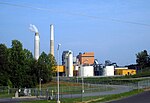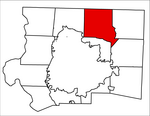Walnut Cove, North Carolina

Walnut Cove is a town in Stokes County, North Carolina, United States. The population was 1,536 at the 2020 census.It is the home of the Walnut Cove Springfest, which draws many visitors to the area. Festival-organizers marked 1889, the town's incorporation date, but the town's roots date to the mid-18th century when it was known as Town Fork. Town Fork settlers formed a bond with Moravians in Bethania and Bethabara. Eventually, William Lash, a Moravian settler at Bethania, bought land along the Town Fork Creek, which later developed into a large plantation named Walnut Cove. The Town was a railroad center in its former years, and today remnants of the old Train Depot still stand on Depot Street. It is also home to historic Covington House (built in 1821), Fulp-Marshall Home (built in 1836), Culler Roller Mill now known as Monitor Roller Mill (built in 1900). Walnut Cove is also home to South Stokes High School, a big part of the town is located to the west of town, near NC 8 and Hawkins Road. Belews Lake and Hanging Rock State Park are located nearby. Winston-Salem is 23 miles (37 km) to the southeast via US 311, US 158 and Salem Parkway (US 421). Danbury is 10 miles (16 km) to the north via NC 89. Germanton is 6.6 miles to the west-southwest via NC 65. Madison and Mayodan are 14 miles (23 km) to the northeast via US 311. Other nearby cities include Kernersville, Walkertown, Rural Hall, Stokesdale, and the small community of Pine Hall.
Excerpt from the Wikipedia article Walnut Cove, North Carolina (License: CC BY-SA 3.0, Authors, Images).Walnut Cove, North Carolina
2nd Street,
Geographical coordinates (GPS) Address Nearby Places Show on map
Geographical coordinates (GPS)
| Latitude | Longitude |
|---|---|
| N 36.293888888889 ° | E -80.140833333333 ° |
Address
2nd Street 201
27052
North Carolina, United States
Open on Google Maps






